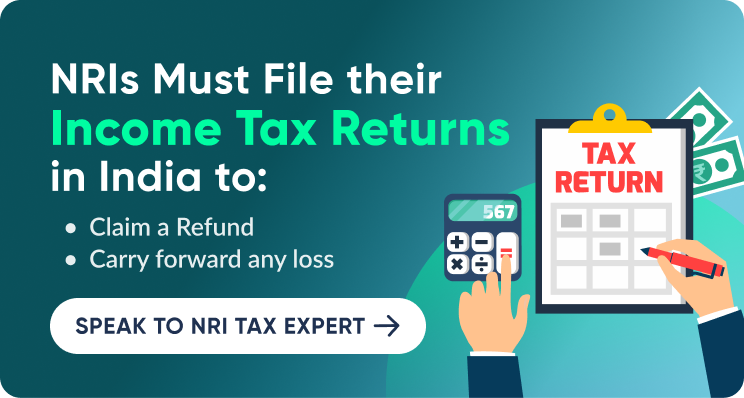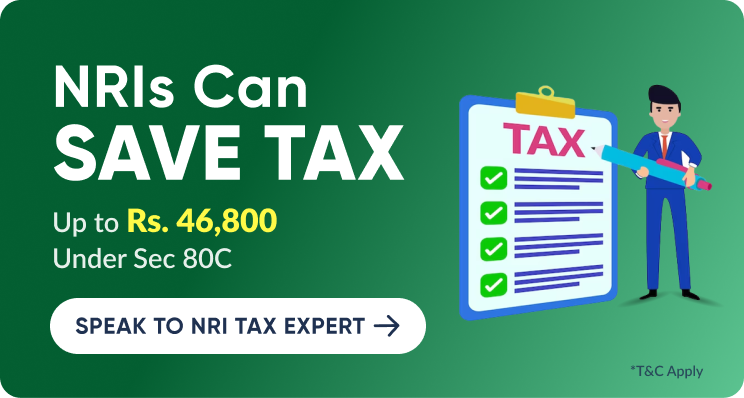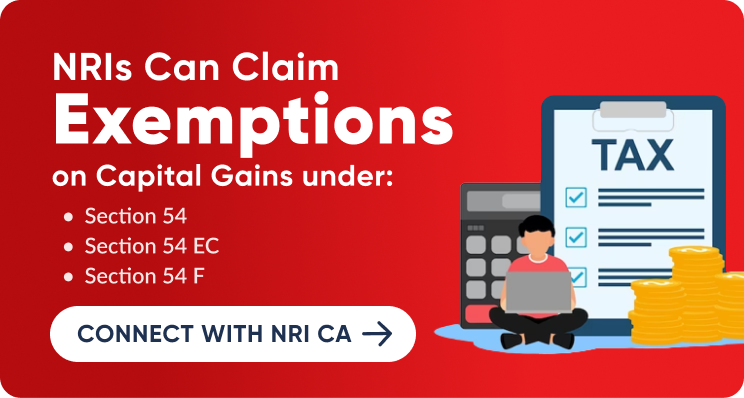The Financial Act 2020 has added Sub-section (1G) in Section 260C of the Income Tax Act 1961. The provision to collect tax on remittance was introduced in the Finance Act. The tax collected at source (TCS) at the rate of 5% shall be imposed on the money sent outside India under the Liberalised Remittance Scheme (LRS) of the RBI. The new income tax rule has been effective from 1 October 2020. Here’s all you need to know about the new tax rule and how NRIs can save TCS on foreign remittances.

For any query related to foreign remittance or tax on outward and inward remittance, connect with a tax expert (CA), right away by clicking the link below.
Also Read: Outward Remittance for NRI: Sending money abroad from India
- A TCS of 5% will apply for foreign remittances for foreign tour packages for the first Rs. 7 lakhs per individual p.a. A rate of 20% will be applicable for expenditure above this limit.
- However, after the announcement of the Union Budget 2023-24 for NRIs, the rate of TCS for foreign remittance for other purposes under LRS and purchase of overseas tour packages has been revised from 5 per cent to 20 per cent.
- In case of foreign remittance for medical treatment and education-related foreign remittances made out of education loans, a TCS of 0.5% will apply for an amount exceeding Rs. 7 lakh.
- If the PAN is not provided to an authorised dealer of the foreign exchange, the TCS will be 10%.
- If you have already paid tax as TDS and still the TCS is levied, you can claim a refund from the TCS.
- Resident individuals can remit up to $250,000 per financial year.
- NRIs can transfer up to $1m per financial year from the balance in their NRO account to NRE or foreign account.
- Remittance above the mentioned amounts will require special permission from the RBI.
- TCS shall not apply for remittances less than Rs. 7 lakh.

How it Works
The TCS will be collected by a dealer (which is usually a bank) at the time of receipt of the amount for remittance, or at the time of debiting the amount payable, whichever is earlier. TCS will apply only on the amount above Rs. 7 lakh in a financial year, instead of the total amount. For example, if you want to remit Rs. 12 lakh, the TCS will be levied on Rs. 5 lakh only and the tax collected at sources will be Rs. 25,000. So, to remit Rs. 12 lakh outside India, you have to pay Rs. 12, 25,000 (Rs. 12 lakh + 5% of Rs. 5 lakh).
If the buyer is an NRI (Non-Resident Indian) or a foreign company, Surcharge and Health & Education Cess will be added to the TCS.
Tax Implications on Foreign Remittances
New rate of tax on sending money abroad from India will be applicable in the following cases:
- Foreign tour packages
- Providing loans
- Sending gifts to relatives who are living abroad
- Buying stocks of foreign companies
- Buying property abroad
- Immigrants remitting funds to their foreign bank account
Rate of TCS on Foreign Remittance
- 5% TCS for foreign remittance
- 0.5% TCS on foreign remittance for education
- 10% TCS will be levied, if the buyer doesn’t furnish PAN number
- Surcharge and Health & Education cess will be applicable in case of NRI or a foreign company
| Particulars | Rate | If PAN is not submitted |
|---|---|---|
| Remittance in excess of Rs. 7 lakh | 5% | 10% |
| Remittance funded by education loan | 0.5% | 5% |
If you don’t have a PAN card, you can apply for a PAN for NRIs through SBNRI.
How NRIs can Save TCS on Foreign Remittance
The foreign remittance tax rate in India has increased, which could result in higher fees for overseas money transfers. However, there are ways to lower your taxable income. Banks collect money for any transaction where TCS is applicable, but you can adjust the TCS amount based on your tax liability.
For example, if you send Rs. 5 lakh to a relative living abroad, there will be a TCS of Rs. 1 lakh. But if you have a tax liability of Rs. 2.5 lakh, you can reduce your tax amount by adjusting it with the payable TCS. This would result in a net tax liability of Rs. 1.5 lakh. Banks typically provide a TCS certificate when deducting TCS, which can be used to claim refunds when filing your income tax returns.
If you don’t have taxable income, you can claim the TCS amount deducted as a refund. Additionally, if your total tax liability is less than the TCS amount, you are eligible for a refund.

How to Avoid TCS on Foreign Remittance?
Funds transfer by NRIs or PIOs from the balance held in their NRO account to an NRE account or overseas bank account is termed as repatriation. Funds up to USD 1 million can be repatriated from an NRO account per financial year. Under Section 206C(1G), TCS is not applicable on money remitted by NRIs from their NRO account to NRE/ foreign account.
Hence, NRIs can easily remit their Indian earnings, like pension, dividend, salary, rent, investment, profits from businesses permitted for repatriation, distribution from any type of deposits, etc. using their NRO account.
How SBNRI can Help NRIs Save TCS on Foreign Remittance
SBNRI is one of its kind online platform that offers a suite of online banking and investment products and services to NRI customers. NRIs can open an NRO account online to save, manage and repatriate their Indian income. Moreover, NRIs don’t need to visit the Indian Embassy for document attestation to open an NRI account.
Here are simple steps to apply for an NRO account with minimal documentation and in a few steps via the SBNRI App:
- Download the SBNRI App and sign in using your credentials.
- Click on ‘Open NRI Account’ button and select the bank where you want to open an NRI account.
- Scan and upload KYC documents using the in-app scanning feature.
- Click on ‘Apply’ and that’s it.
SBNRI will help you to get the following documents required to submit for remittance of funds to NRE/ overseas bank account:
1. Form 15CA: Undertaking by the user to be signed physically or digitally.
2. Form 15CB: Certificate issued by a Chartered Account, confirming that applicable taxes have been paid on the remittance.
Due to lots of information and documentation required to apply for NRI accounts, NRI account opening process is lengthy and cumbersome elsewhere. You can download SBNRI App to apply for an NRI account with nominal documentation in just 10 minutes.
You can also click on the button below to apply for an NRI account. Visit our blog and YouTube Channel for more details.
FAQs
Authorized dealer (which is usually a bank) is required to collect TCS at the rate of 5% on the amount of remittance exceeding Rs. 7 lakh under LRS.
The Liberalized Remittance Scheme allows individuals to remit up to USD 250,000 per financial year for making investment in shares, debt instruments, study, gifts, among other things.
The tax shall be collected on the amount in excess of Rs. 7 lakh from 1st October 2020.
TCS is not applicable if buyer is:
– Government
– Remittance on account of overseas tour program package



